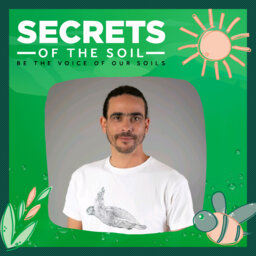🌱 Excited to share insights from the latest episode of “Secrets of the Soil” with Charlie Arnott! Charlie joins us to discuss the powerful shift from conventional to regenerative farming and how we can all start healing the landscape with a regenerative mindset.
🌟Key Takeaways:
– Regenerative Practices Over Certifications: Charlie emphasizes that regenerative agriculture should focus on restoring natural cycles, improving quality, and nutrition rather than merely achieving certifications.
– Educational Shift for Future Generations: Charlie highlights the crucial role of good food, nature, and healthy expression in preventing child illness and mental dysfunction. Parents must equip their children with emotional, physical, mental, and nutritional tools for independence.
– Journey of Continuous Learning: The conversation delves into the need for a mindset shift in farming—viewing it as a partnership with nature. Charlie encourages curiosity, innovation, and making mistakes as part of learning and evolving farming practices.
🌍 The discussion emphasizes the transformative power of biodynamics, the necessity of reflection and intention, and ultimately, the significance of being kind to the earth and our future selves.
Who is Charlie Arnott?
Charlie is an award-winning grazier from Boorowa, New South Wales, Australia, an educator and passionate advocate for Regenerative Farming practices. His family business has developed under Charlie’s guidance from a ‘conventional’, industrial high input mixed enterprise farm working against Nature to a Biodynamically principled holistically managed farm partnering with Nature.
Charlie started his Regenerative Farming journey 15 years ago. Previously he and his family had been farming conventionally on their 5,000-hectare property “Hanaminno” for over 35 years, in an industrial high input/ high output farming business model, heavily reliant on pesticides, herbicides, and man-made fertilisers.
After a series of epiphanies and through education Charlie found the Regenerative Agriculture movement, a movement that reflected his instinctive connection to the land and his ethos of producing quality food for his family and the world.
Today, Hanaminno is managed using organic, biodynamic and holistic grazing principles, and produces beef, lamb, and pigs, pasture-raised on 100% native and exotic species, raised sympathetically within the landscape and the resources it provides, proactively marketing products direct to their clients, focusing on providing clean healthy nutritiously dense food direct to butcher and families.
The animals are handled in a ‘low-stress stock’ fashion, considerate of their individual and mob behaviour; they are 100% chemical-free and are not treated with any hormones, vaccines, or drenches.
Charlie believes the decision to move away from trying to get nature to do what man wants, and instead of learning how best to collaborate with nature, is key to not only a prosperous farming business but also to a farmer’s health, consumer health, and the land’s health. The business is not certified organic, nor Biodynamic, however, prefers being known as ‘Certified by Community’, given the transparency and openness to the public and clients under which the farm operates. Clients are considered ‘co-producers as they play a vital role in guiding the production of food through their feedback and connection with the farm.
Charlie and his team host and facilitate 2-day workshops at Hanaminno and across Eastern Australia, teaching farmers, gardeners, and families the principle and practices of Biodynamics, and hold open community preparation making events on farm to foster the skills and experience for farmers to create a relationship with their landscape, and be self-reliant.
Charlie considers himself and his team sunshine and water harvesters, soil builders, pasture and animal nurturers, change facilitators, educators, community supporters, and Nature partners. With a focus on putting the ‘culture’ back into Agri-culture. Charlie has received several agricultural industry awards for leadership, resource management, and conservation, more recently the prestigious Bob Hawke National Landcare Award 2018. The award acknowledges a person who has demonstrated a remarkable commitment to caring for the land, champions better practices, and gives their time to share knowledge with others.

In this enlightening episode of “Secrets of the Soil,” our hosts ‘Regen Ray’ Milidoni and guest Charlie Arnott dive deep into the regenerative agriculture movement—a holistic approach that aims to restore and enhance the health of our farmlands and, thereby, our overall well-being. The conversation navigates through a variety of crucial facets, from redefining agricultural practices to the importance of connecting with our food sources. Below, we explore the key takeaways from this illuminating episode.
Redefining Regenerative Agriculture
Charlie Arnott defines regenerative agriculture as any practice or philosophy that builds quality and quantity in farming. According to Arnott, the essence of regenerative practice revolves around restoring the function of natural cycles in the environment. It’s not just about ‘ticking certification boxes’ but about fundamental improvement in food quality and nutrition.
This philosophy urges farmers to adopt a mindset that places importance on natural interactions rather than artificial augmentations. The ultimate goal is to create practices that are personal and unique to each individual or farm, thus making the entire process more enriching and grounded.
Beyond Certifications: Quality and Nutrition
Certifications often drive farmers toward meeting regulatory standards, sometimes neglecting the quality and nutritional essence of food. Charlie expresses skepticism about such certifications, encouraging both consumers and farmers to focus instead on improving soil and crop health. This mindset leads to better food quality, which in turn provides richer, more nutritional harvests.
He emphasizes the need to ask the right questions about food quality and seek deeper connections with nature. The goal isn’t simply to produce more food but to ensure that every bite we take fuels our bodies in the best possible way.
The Consequences of Disconnect: Health Impacts
A stark observation made by Charlie is the impact of disconnection from natural food sources on our children’s physical and mental health. The lack of good food and environmental connection leads to various illnesses and mental dysfunctionality among the younger generations. This issue illuminates the far-reaching consequences of conventional farming and processed foods.
By focusing on regeneratively grown and organically produced food, parents can prepare their children for healthier, more balanced lives. It’s a call to rethink our food consumption habits and the importance of better nutritional choices for future generations.
Farm Visits: Reconnecting with Our Food
Another significant topic discussed is the importance of reconnecting with our food sources by visiting farms. Charlie and Regen Ray emphasize the necessity of understanding where our food comes from and the processes behind it. Visiting farms allows consumers to witness firsthand the efforts put into regenerative farming practices and appreciate the value of high-quality produce.
The idea is simple: by appreciating the hard work behind our food, we cultivate a deeper sense of responsibility toward our consumption practices and choices.
Labeling for Clarity: Food vs. Chemical Food
One of the striking points made by Charlie is the need to differentiate between ‘food’ and ‘chemical food.’ Clear labeling would foster greater awareness and accountability, helping consumers make informed choices about what they ingest. This shift could drastically impact public health, pushing more people towards organic and regeneratively farmed food.
Regen Ray questions the perceived affordability of organic produce versus cheaper, chemically-laden options. Investing in high-quality ingredients now can prevent future health issues, saving time, money, and well-being in the long run.
Biodynamics: A Personal Journey
An essential aspect of the conversation is Charlie’s personal journey into biodynamics, a regenerative practice that has revolutionized his approach to farming. These practices involve the intentional use of soil activators and emphasis on natural cycles and cosmic connections.
Charlie’s journey isn’t just inspirational but highlights how adapting biodynamic practices to one’s specific farm can lead to profound changes, healing the land and improving yields. It underscores the magical essence of biodynamic farming and its alignment with nature’s rhythms.
Treading Lightly on Our Earth
As the episode concludes, Charlie emphasizes the importance of treading lightly on the earth and showing reverence for the landscape. This humble approach ensures that our farming practices contribute positively to the environment, nurturing life and fostering a mindset of sustainability.
The podcast invites all ‘soil lovers’ to get outside, get their hands dirty, and dig deeper into understanding their soils. It’s a call to embrace a regenerative mindset, reflecting on our actions, making amends for past mistakes, and embarking on a continual learning journey towards sustainable farming.
Join the Journey
Immerse yourself in the world of regenerative agriculture, and tune into “Secrets of the Soil” to keep your hands—and heart—connected with our precious land. Whether you’re an avid gardener, a farmer, or simply someone passionate about healthy living, this episode promises to inspire and educate on transforming our agricultural practices for a healthier, happier future.






